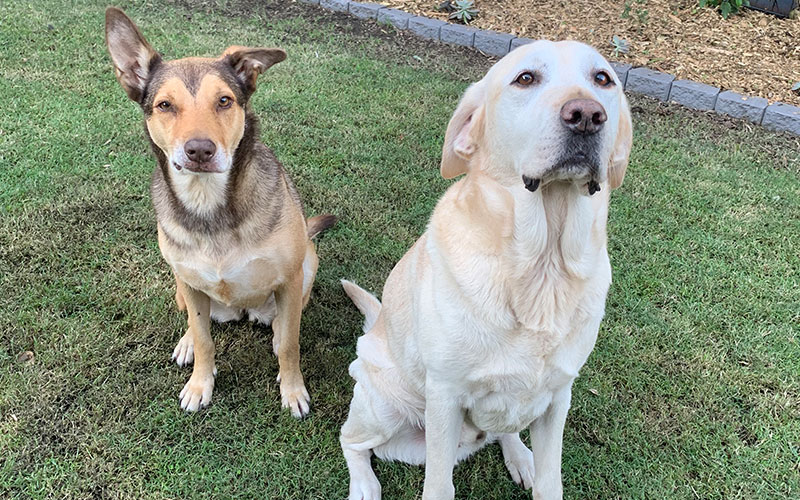- Seems obvious but make sure you take their collar, leash, food and water. We generally use food and water bowls from home as they are familiar.
- Sort out sleeping. There are a few options here:
- Collapsible crates are excellent if your dog is crate trained.
- A short lead and bed outside to keep them safe. This might seem a bit harsh but some breeds respond well to this.
- Have them in the tent with you (this can end badly and very messily if you don’t wake up quickly enough to let them out in the night after all that cow poo and creek water hits their bowels – trust me on this one).
- My preferred option is to have them in the back of the ute (with a canopy). It is kind of like using a crate but dogs are together (I have a Labrador and a Kelpie). They have space to move around, can have a window open for air and can have water if it is a hot night. You could probably use a car or wagon the same way.
CAMPING WITH DOGS

Our Dogs Milo And Bailey

Bailey
There would be many other methods I’m sure but these are what I use. Just make sure your dog knows that when put wherever you prefer that they know the day is over and it is chill time.
- Use tick protection, frontline/revolution etc. While I do not use these at home due to chemicals, they are a must when camping as there are many paralysis ticks and cattle ticks everywhere. If you do not use them then you must fully check your dog a couple of times a day.
- While we prefer not to leave our dogs at camp alone, if it is absolutely unavoidable a long lead or tether words well if you do not trust your dog to stay at camp. They will then have a large range of motion. You can even feed the handle of your lead through the winch cable and run it to a tree 20m away in a pinch.
- Take the dog regularly camping in small trips first (even as a young puppy) to get them used to it. You dogs will absolutely love it and you will as well.
- Anywhere you go, beware of wild dog baits. They do not discriminate between wild dogs and your beloved pet. They are very bad.
- Take your dog on lots of walks, off lead if possible. We even have one of ours trained to follow the kids if they go for a walk by themselves. You will just need to make sure if they are off lead that they will come back when called – even if they are interested in the kangaroo jumping through the paddock or cow walking through camp.
- Finally, once home give them a full check over for ticks, cuts and scrapes and attend to these as soon as possible. We camped with a family once whose dog cut his foot on a rock and they waited 2 days to take him to the vet, by which time the very deep cut had gotten infected and was quite expensive to treat.
Be prepared though – next time you pack the car for camping the dog will be watching intently and silently begging to be included. I promise.
If you couldn’t find what you were looking for on this page, you might like to try one of the useful links or visit our social media sites. Or simply ask us a question and we will be happy to help you.
GET IN TOUCH
- Call us: 0481 066 755
- Email: admin@freedom4wdadventures.com.au
- Address: Po Box 240, Ferny Hills, Brisbane, QLD 4054, AU


